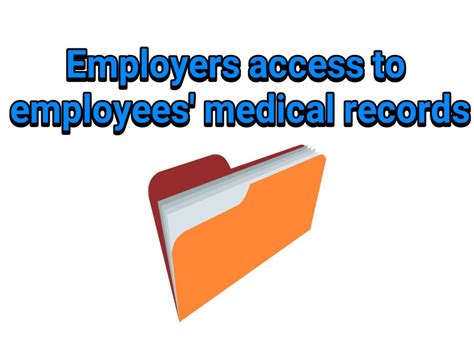With increasing healthcare costs and a growing emphasis on workplace wellness, employers are becoming more interested in the health status of their employees. As a result, some employers are asking employees to provide medical records as a condition of employment or as part of a health screening program. However, this practice raises important legal and ethical concerns.

Legal Protections for Employees
The Americans with Disabilities Act (ADA) prohibits employers from discriminating against employees with disabilities. This includes making employment decisions based on an employee’s medical condition. The ADA also requires employers to keep medical information confidential.
The Health Insurance Portability and Accountability Act (HIPAA) also protects the privacy of health information. HIPAA requires covered entities, including employers, to take steps to protect the privacy and security of health information.
Employer Exceptions
There are a few exceptions to the general prohibition against employers asking for medical records. For example, employers may ask for medical records:
- To verify an employee’s ability to perform a job function.
- To provide reasonable accommodations for an employee with a disability.
- To administer a health screening program that is voluntary and does not result in adverse employment actions.
Employee Rights
Employees have the right to refuse to provide medical records to their employer. However, an employer may be able to take adverse employment actions, such as firing or demoting an employee, if the employee refuses to provide medical records that are necessary for the employer to make a job-related decision.
If an employee is concerned about providing medical records to their employer, they should talk to an attorney or contact the Equal Employment Opportunity Commission (EEOC).
Ethical Considerations
In addition to the legal issues, there are also ethical considerations to keep in mind when asking for medical records. Employers should only ask for medical records that are necessary for a legitimate business purpose. They should also take steps to protect the privacy and confidentiality of the medical information.
Best Practices for Employers
If an employer is considering asking for medical records, they should:
- Consult with an attorney to make sure they are in compliance with all applicable laws.
- Develop a clear and concise policy on requesting medical records.
- Train managers and supervisors on the policy.
- Only ask for medical records that are necessary for a legitimate business purpose.
- Take steps to protect the privacy and confidentiality of the medical information.
Tips for Employees
If an employer asks you for medical records, you should:
- Talk to your doctor or an attorney to understand your rights.
- Only provide medical records that are necessary for the employer to make a job-related decision.
- Ask the employer to keep the medical information confidential.
Conclusion
Asking for medical records is a sensitive issue that can have legal and ethical implications. Employers should only ask for medical records that are necessary for a legitimate business purpose and should take steps to protect the privacy and confidentiality of the medical information. Employees have the right to refuse to provide medical records to their employer, but they should be aware that the employer may be able to take adverse employment actions if the employee refuses to provide medical records that are necessary for the employer to make a job-related decision.
